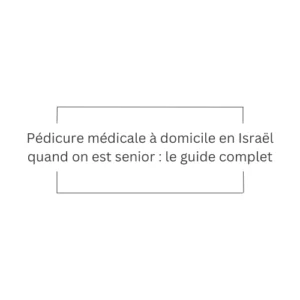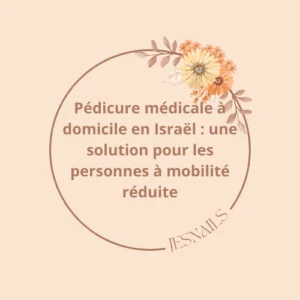People with diabetes know how much managing their condition requires constant vigilance. Among the often overlooked but essential aspects of this management: foot care. Indeed, the feet of diabetic patients are particularly vulnerable to injuries, infections, and serious complications that can lead to amputation.
In Israel, and more specifically in cities like Ashdod, Ashkelon, Tel Aviv, Gan Yavné, or their surroundings, it is now possible to benefit from diabetic foot care at home thanks to professionals trained in medical pedicure for this type of condition.
In this article, we will explain in detail why this care is vital, what it consists of, the risks associated with poor maintenance, and how to organize regular home care.
Why are feet so sensitive in diabetics?
Diabetes profoundly impacts the nervous system and blood circulation. Two main complications should be known:
1. Diabetic neuropathy
This condition leads to a progressive loss of sensitivity in the feet. As a result, the patient no longer feels small injuries, cuts, or burns. A poorly treated blister, a stone in a shoe, or a cut while walking barefoot can go unnoticed… until an infection appears.
2. Diabetic arteropathy
It causes a decrease in blood supply, which slows down wound healing and increases the risk of infection. In Israel, high temperatures and open shoes in summer exacerbate these risks. These two phenomena, combined, can turn a small injury into a severe lesion.
What warning signs should be monitored?
A daily inspection is essential. Here are the signals that should alert you:
- Persistent redness
- Dry, cracked, or fissured skin
- Ingrown or thickened nails
- Fungal infections between the toes
- Swelling or unusual pain
- Wound that does not heal after 48 hours
- Burning or tingling sensation
As soon as any of these signs appear, it is strongly recommended to consult a professional in medical pedicure specialized in diabetic foot care.
What does diabetic foot care at home include?
Hiring a specialized medical pedicurist who comes to your home in Ashdod, Ashkelon, Tel Aviv, or Gan Yavné guarantees you appropriate care in a safe environment. The session generally includes:
- Comprehensive visual examination: thorough inspection of the toes, nails, heels, and soles of the feet.
- Hygiene: antiseptic cleaning, meticulous drying, application of specific moisturizing creams.
- Nail trimming: straight and without injury, using sterilized equipment.
- Gentle removal of calluses, corns, and hard skin, to avoid friction and pressure points.
- Personalized advice: choice of shoes, suitable creams, recommendations for physical activities or prevention.
The ideal frequency of care varies depending on the cases, but a visit every 4 to 6 weeks is generally recommended.
Why choose home care?
Home care offers many advantages for diabetic patients, especially in Israel where travel, heat, or religious constraints can make movement difficult.
Advantages:
- Comfort: you stay at home, without transportation constraints.
- Safety: no exposure to external infections (transport, waiting rooms).
- Optimized time: no waiting in line or wasting time.
- Personalized service: the professional can observe your daily environment and provide targeted advice.
- Regular and discreet follow-up.
In cities like Ashdod or Tel Aviv, where the aging population and chronic diseases like diabetes are on the rise, home services are increasingly in demand.
Some tips between visits
Between two professional treatments, it is important to adopt a few simple but essential gestures to preserve your feet:
- Wash your feet every day in lukewarm water, never hot. Test the temperature with your hand.
- Dry thoroughly, especially between the toes to avoid fungi.
- Apply a moisturizing cream, except between the toes.
- Wear clean, cotton socks, never damp.
- Avoid walking barefoot, even at home.
- Inspect your feet with a mirror or ask for help from a loved one.
Testimonial: Corine, 67, Ashkelon
“Since I discovered the home medical pedicure service, I really feel safer. Before, I waited until I was in pain to consult. Now, every month, I am followed at home. The professional is very gentle, attentive, and always gives me good advice. It’s a real relief for me.”
In conclusion: better to prevent than to cure
Diabetic foot care is much more than a hygiene act: it is an essential medical prevention gesture. By opting for regular follow-up, especially at home, you significantly reduce the risk of infection, hospitalization, and amputation.
The services of home medical pedicure in Israel, available in Ashdod, Ashkelon, Tel Aviv, Gan Yavné, and their surroundings, represent a practical, humane, and secure solution for diabetic patients. Don’t wait for a problem to arise to take care of your feet — act today.


